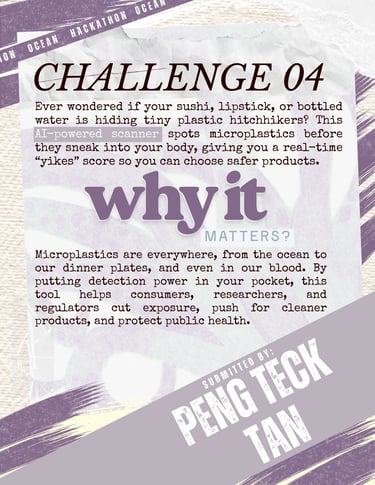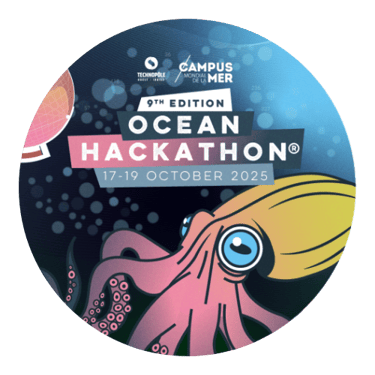Challenge KUL 04 :An AI-Powered Microplastics Scanner for Food, Cosmetics, and Consumer Safety
CHALLENGES 2025
8/23/20251 min read


The AI-Powered Microplastics Scanner is an innovative solution designed to address the growing global concern over microplastic contamination in everyday products, including food, water, and cosmetics. As microplastics are now found in over 93% of bottled water and even in human tissues such as placentas and blood, there remains no accessible, scalable tool for consumers, researchers, or regulators to assess this risk in real time.
Traditional detection methods, reliant on lab-based spectroscopy, are expensive and impractical for public use. This project proposes a smartphone- or scanner-based tool powered by AI that evaluates microplastic risk through three primary signals: ingredient label analysis using OCR and keyword detection (e.g., polyethylene, acrylates), historical contamination data linked to product types or brands, and geospatial pollution data tied to product origins (e.g., seafood from plastic-polluted waters). By fusing these signals with a probabilistic model, the system produces a real-time Microplastics Risk Score (0–100), complete with visual highlights and weekly exposure tracking.
The platform supports diverse users—from consumers comparing skincare products orseafood, to NGOs running advocacy campaigns, to retailers and regulators monitoring supply chains. The high-level architecture integrates a React/Expo-based frontend, a Flask or Node.js backend with AI models (OCR, CNN, NLP), a pollution-aware database, and a dashboard for analytics. Scientific backing includes recent breakthroughs in AI-based spectroscopy and global pollution datasets from NOAA, UNEP, and others. Core features include product scanning, ingredient risk explanation, food origin mapping, exposure logging, and brand/regulatory watchlists. With potential to drive cleaner formulations, inform public health decisions, and power large-scale research studies, the AI-Powered Microplastics Scanner offers a practical, open-science approach to tackling one of the most pervasive and invisible threats in our modern environment.
A minimum viable product is the ultimate goal, but if time is a huge constraint, it would just be a prototype with sufficient backup on its implementation
A passion to be part pf something meaningful is all I need, background can be diverse, be it computer science or marine biology, all is welcome
Essential team skills:
Development Goals for the 48-Hour Hackathon:
About the Challenge :
Connect
Join us in ocean sustainability and innovation.
© 2025. All rights reserved.
